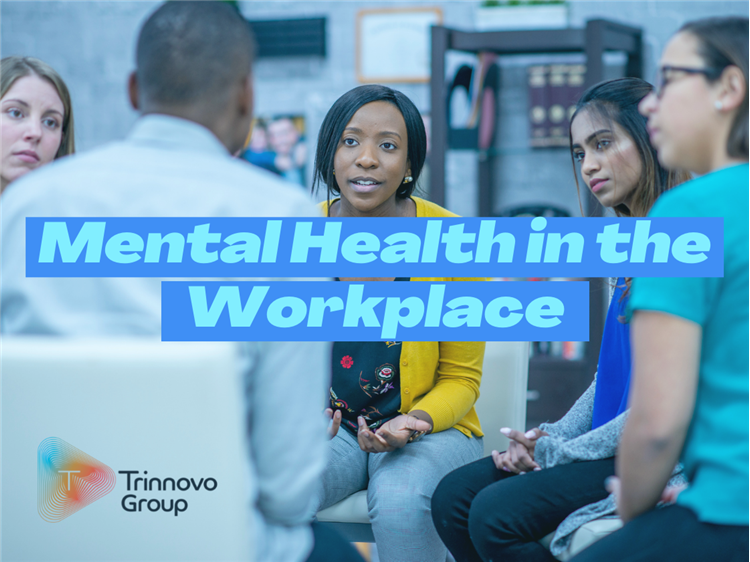
Mental Health in the Workplace
Your mental health influences the way that you think, feel, and behave. This means that your social, professional, and personal life can all be affected by your mental wellbeing.
On average, you spend over a third of your life at work. As a result, it’s so important for employers to not only take some responsibility for their employees’ mental wellbeing but to actively commit to support employee mental health.
With stress and anxiety are amongst the most recognised mental illnesses, the prevalence of work-induced stress and anxiety is all too common.
Too much can lead to burnout, disengagement, absences, and strained workplace relationships.
Although there are clear and measurable outputs relating to productivity and performance, the importance of mental wellbeing in the workplace is not an aspect to capitalise on.
There are so many intrinsic benefits of a happy and healthy workforce:
Better equipped to cope with stress
Boosts resilience
Ability to reach the highest potential
Ability to empathise with others
Better cognitive and social skills
Despite the measurable factors, one thing that is of high importance is employee ‘presenteeism’ or engagement with their role. Employees who are more present aren’t just showing up to work, they’re more engaged, more involved.
And there are so many ways in which employers and managers can support their people.
Offer flexibility and be inclusive
Invest in training
Modify policies and practices
Ensure accountability – measure
Communicate (even more than you feel necessary)
Lead by example/model healthy behaviours
Communication is key:
Arguably, the most important takeaway here would be to communicate. There is little benefit from flexible work offerings, manager training and updating policies if none of those affected are aware of the potential benefits and support on offer. However, some employees feel that there would be a backlash on their reputation in the workplace and that a potential promotion might be affected if they took time off due to mental health.
This can be evidenced in a recent study Forbes undertook in that “more than four in 10 employees are concerned about retaliation if they seek mental health care or take time off for their mental health”. The younger workforce is most concerned, with “nearly six in 10 (59%) of employees 18 to 29 years old” being ‘somewhat or very concerned’ about being fired if they take time off for mental health needs, “compared to 39% of 45 to 64-year-olds". Clearly, employers need to do more to not only communicate what support they can offer employees mental health but also reassure staff that it won’t have a knock-on effect on their career or position within a company, should they utilise such support. Your mental health is just as important as your physical health, and therefore staff need to appreciate that by only looking after their mental health and availing of resources, can they perform at their best in the workplace.
Working from home and mental health:
Nearly everyone has been affected by the pandemic in some way from a mental health standpoint. Flexibility in working (in relation to the actual hours worked, and hybrid working) has been a pivotal mental health discussion in relation to the pandemic and is a prevalent contributory factor in candidates considering a new employer and a potential work/ career move. This is evidenced in a recent survey taken in the U.K which found that 88% of professionals consider the mental health policies of a potential employer important when looking for a new role.
The past two years have resulted in unprecedented change across every industry and sector. In the workforce, one of the main initial changes and challenges, which is now (arguably) one of the only benefits of the pandemic, has been the employer's appreciation for the hybrid approach to working. In the professional services sector, the culture of being ‘physically seen’ in the office, was a toxic but genuine characteristic of many employers and workplaces.
Now employers have realised that workers can be more effective in their role and in the workplace if given the opportunity and flexibility to work from home, with more than 61% of the U.K and Irish workforce now working in a hybrid model.
Naturally, mental health was a huge consequence for many during the initial stages of the pandemic. Research from Mental Health Foundation and LinkedIn reveals that 57% of professionals are more stressed and anxious about work since lockdown started.
However, the work from home policy has given a lot of employees a greater sense of freedom and autonomy with their work. Less time spent during the commute or socialising in the office, allows more people to be effective whilst working from home and has boosted productivity.
Although, whilst working from home has advantages and benefits, it also comes with major drawbacks, including isolation and loneliness and difficulty getting away from work for personal time. A recent study at the University of Oxford proved that “Nearly two-thirds of people working from home feel isolated or lonely at least sometimes and 17% do all the time”. Additionally, it found that “more than two-thirds of employees who work from home at least part of the time report they have trouble getting away from work at the end of the day always (22%) or sometimes (45%)”. This in turn has a negative and potential long-lasting effect over time on employees' mental health, begging the question, is work from home more detrimental than beneficial to employees' mental health?
What might work for one employee, might not suit another. A blanket approach shouldn’t be placed on all employees and different approaches to flexible working should be adopted for certain individuals within a company.
How can companies do better?
The main takeaway is that communication with staff is key. Creating a sense of belonging and community for employees to raise how their feeling mentally/ on their well-being, in general, should exist within every company culture. Mental health affects everyone, and employers need to do more and ensure it is at the forefront of their company policies offering greater employee wellbeing via; more flexible working (whatever works for certain individuals), a greater, supportive community with an open forum for communication, a work/ life balance culture, and an appreciation that with better mental health, employees will perform better and in the long term, which will lead to the greater success and culture of a company.

